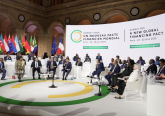On 19 and 20 June 2017, the conference “Political Remittances and Political Transnationalism: Narratives, Political Practices and the Role of the State” gathered together an international group of researchers to Nuffield College, Oxford University, to share perspectives on the political impact of migrants and migration. The conference was convened by Lea Müller-Funk, visiting OxPo Fellow at Oxford University from Sciences Po, Paris, and Félix Krawatzek, British Academy Postdoctoral Fellow at the University of Oxford’s Department of Politics and International Relations (DPIR) and Research Fellow at Nuffield College. The intention of the workshop was to connect migration scholars across various disciplines including history, anthropology, political science and linguistics around a discussion of the conceptual value of the term “political remittances” as a lens through which to approach the study of political transnationalism.
This conference emphasised how human mobility has, across diverse geographical contexts and time periods, created both opportunities for migrants’ political engagement and alternative sites of power. In contrast to conceptualisations of migration as a finite transition from one space to another, the workshop aimed to expose how the relationship between places of destination and origin is constantly (re)made by the people and transnational flows that bridge them. The migration scholarship has traditionally been concerned with the position of migrants vis-à-vis countries of residence and their interaction with official structures; the study of political transnationalism, however, attunes us simultaneously to the multi-dimensional, fragmented and shifting nature of migrants’ political lives.
It was argued that the concept of “political remittances” contributes to the theoretical field on political transnationalism by expanding the concept of economic remittances – shifting the focus instead to the less tangible flows across origin, destination and the spaces in-between. Transmissions among home and host, then, extend beyond the cross-border transfer of tangible or directly observable resources. The practices, identities and norms linking people, politics and place are no less influential for our inability to quantify them. Indeed, these resources have the potential to influence migrants’ senses of belonging and perceptions of political involvement in real and significant ways. Further, “political remittances” could be said to offer a historically-neutral alternative to concepts such as “transnational political space”, which impose ideas of state-ness and territoriality as objects of study in contexts where this may not be appropriate.
The two-day workshop was comprised of six panels, across which a total of 20 papers were presented. The programme commenced with discussions of the three substantive themes of the conference: political practices, identity and the role of the state. Whereas the “political practices” and “identity” panels focused on the ways in which migrant identities, senses of belonging, forms of political participation and destinies are shaped by the act of remitting, the last panel considered the varying roles that nation-states play in the diffusion of political remittances. The aim of the second day was to showcase the innovative approaches currently being undertaken in the study of political transnationalism. Panels looked at the interpretive possibilities offered by narrative and techniques of text analysis, as well as some of the theoretical and methodological advances being made in the field.
The presentations attested to the range of actors implicated in the study of transnational politics. Topics were approached from several vantages, emphasising the role and interest of states; “return” migrants; oppositional movements; diaspora, migrant and exiled communities abroad; regional networks; and elite conceptualisations of change. Workshop participants identified the tensions and contradictions between the bordered and border-less over the course of their collective endeavour to highlight how human mobility has provoked the reconfiguration – even activation – of political identities and systems of power.
Papers illustrated the political dimensions of transnational linkages through a range of case studies drawn from the 19th to the 21st century. Geographical contexts of focus included Germany, Tunisia, the United States, Denmark, Mexico, Turkey, Morocco, Egypt, Austria, France and Japan – in addition to the comparative studies presented. The programme’s sensitivity to longer-term perspectives exposed the historical rootedness of modern political practices. This awareness, more generally, lends itself to the incorporation of historical interpretations into contemporary analyses of political transnationalism. The array of approaches undertaken in the papers similarly testified to a dynamic field of study: among the techniques demonstrated were the textual analysis of migrant correspondence, life story interviews, the analysis of online and offline forms of diasporic activism, archival methods, participant observation, and quantitative methodologies. This range across disciplines, in addition to several examples of mixed-methods approaches, reflects the wide combination of angles from which current scholarship strives to interrogate migrants’ cross-border practices.
Whereas the earlier literature has typically centred around the role of receiving states in shaping transnational loyalties, harking back to the assimilationist paradigm, this occasion was marked by evident appreciation of the multi-directionality of less tangible transfers. The circulation of political notions, behaviours and affiliations are informed in equally palpable ways by the developments and strategies of sending states, in addition to those of host regimes. The conference also provided a setting for timely discussion about how the relationship between places of destination and origin is continuously re-forged – in stark contrast to interpretations of mobility as a process of finite transition.
In addition to exposing the limits of state capacities to mediate the lives of their internal and external populations, the conference spotlighted the transnational and highly fragmented nature of migrants’ political realities. In doing so, it provided a valuable space for dialogue on the agency and patterned experiences of people and communities abroad. The innovative and nuanced work currently being done in the field of political transnationalism, as demonstrated on this occasion, was reflected in enthusiastic engagement with the term “political remittances” by panellists and discussants alike. That this concept is capable of provoking two days of debate among an inter-disciplinary group of scholars is testimony not only to its potential to travel disciplines, but augurs well for its contribution to current theories of political transnationalism.





1 Comment